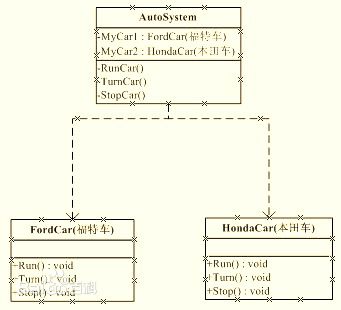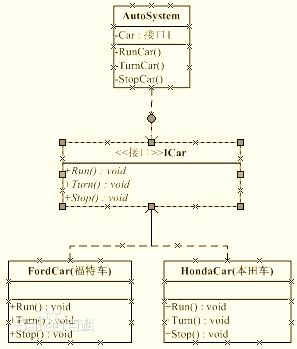前言
最近抽空搞Android App, 因为自己没有这方面的经验,所以github上面找相应的别人实现的app来做参考, 所以很多app基于MVP摸索使用了Dagger2来做了很多的工作,为了加深理解,所以看了下Dagger的一些使用 和实现,发现了依赖注入这个名词,搞C++多年,好像很少听到这个名词,所以抽空研究了下依赖倒置和注入, 其实最后发现是一种设计模式,在C++中用的很多,只是不同的名词来代替,所以这里记录一下自己学习的思考。
核心
依赖倒置原则
A. 高层次的模块不应该依赖于低层次的模块,他们都应该依赖于抽象。
B. 抽象不应该依赖于具体实现,具体实现应该依赖于抽象。
依赖倒置原则(Dependence Inversion Principle)是程序要依赖于抽象接口,不要依赖于具体实现。
简单的说就是要求对抽象进行编程,不要对实现进行编程,这样就降低了客户与实现模块间的耦合。
代码实现及说明
在开发过程中,目前我们有两大方案
- 面向过程的开发,上层调用下层,上层依赖于下层,当下层剧烈变动时上层也要跟着变动,这就会导致 模块的复用性降低而且大大提高了开发的成本。
- 面向对象的开发很好的解决了这个问题,一般情况下抽象的变化概率很小,让用户程序依赖于抽象, 实现的细节也依赖于抽象。即使实现细节不断变动,只要抽象不变,客户程序就不需要变化。这大大降低了 客户程序与实现细节的耦合度。

要求开发一套自动驾驶系统,只要汽车上安装该系统就可以实现无人驾驶,该系统可以在福特和本田车上使用,
只要这两个品牌的汽车使用该系统就能实现自动驾驶。于是有人做出了分析如图

1
2
3
4
5
6
7
8
9
10
11
12
13
14
15
16
17
18
19
20
21
22
23
24
25
26
27
28
29
30
31
32
33
34
35
36
37
38
39
40
41
42
43
44
45
46
47
48
49
50
51
52
53
54
55
56
57
58
59
60
61
62
63
64
65
66
public class HondaCar {
public void Run() {
System.out.println("本田开始启动了");
}
public void Turn() {
System.out.println("本田开始转弯了");
}
public void Stop() {
System.out.println("本田开始停车了");
}
}
public class FordCar {
public void Run() {
System.out.println("福特开始启动了");
}
public void Turn() {
System.out.println("福特开始转弯了");
}
public void Stop() {
System.out.println("福特开始停车了");
}
}
public class AutoSystem {
public enum CarType {
Ford, Honda
}
;
private HondaCar hcar = new HondaCar();
private FordCar fcar = new FordCar();
private CarType type;
public AutoSystem(CarType type) {
this.type = type;
}
private void RunCar() {
if (type == CarType.Ford) {
fcar.Run();
} else {
hcar.Run();
}
}
private void TurnCar() {
if (type == CarType.Ford) {
fcar.Turn();
} else {
hcar.Turn();
}
}
private void StopCar() {
if (type == CarType.Ford) {
fcar.Stop();
} else {
hcar.Stop();
}
}
}
实现针对Ford和Honda车的无人驾驶,但是软件是在不断变化的,软件的需求也在不断的变化。公司的业务做大了, 同时成为了BMW的金牌合作伙伴,于是公司要求该自动驾驶系统也能够安装在这BMW生产的汽车上。于是我们不得不变动AutoSystem
1
2
3
4
5
6
7
8
9
10
11
12
13
14
15
16
17
18
19
20
21
22
23
24
25
26
27
28
29
30
31
32
33
34
35
36
37
38
39
40
41
42
43
44
public class AutoSystem {
public enum CarType {
Ford, Honda, Bmw
};
HondaCar hcar = new HondaCar();
FordCar fcar = new FordCar();
BmwCar bcar = new BmwCar();
private CarType type;
public AutoSystem(CarType type) {
this.type = type;
}
private void RunCar() {
if (type == CarType.Ford) {
fcar.Run();
} else if (type == CarType.Honda) {
hcar.Run();
} else if (type == CarType.Bmw) {
bcar.Run();
}
}
private void TurnCar() {
if (type == CarType.Ford) {
fcar.Turn();
} else if (type == CarType.Honda) {
hcar.Turn();
} else if (type == CarType.Bmw) {
bcar.Turn();
}
}
private void StopCar() {
if (type == CarType.Ford) {
fcar.Stop();
} else if (type == CarType.Honda) {
hcar.Stop();
} else if (type == CarType.Bmw) {
bcar.Stop();
}
}
}
这会给系统增加新的相互依赖。随着时间的推移,越来越多的车种必须加入到AutoSystem中,这个“AutoSystem”模块将会被if-else语句弄得很乱,而且依赖于很多的低层模块,只要低层模块发生变动,AutoSystem就必须跟着变动,它最终将变得僵化、脆弱。
导致上面所述问题的一个原因是,含有高层策略的模块,如AutoSystem模块,依赖于它所控制的低层的具体细节的模块(如HondaCar()和FordCar())。如果我们能够找到一种方法使AutoSystem模块独立于它所控制的具体细节,那么我们就可以自由地复用它了。我们就可以用这个模块来生成其它的程序,使得系统能够用在需要的汽车上。面向对象给我们提供了一种机制来实现这种“依赖倒置”。
根据依赖倒置的原则,把具体的业务厂家的汽车进行抽象化,设计一个“ICar”接口,这个“AutoSystem”类不依赖于“FordCar”等具体的实现类,而依赖于抽象的ICar。所以,依赖关系被“倒置”了:“AutoSystem”模块依赖于抽象,那些具体的汽车操作也依赖于相同的抽象。

1
2
3
4
5
6
7
8
9
10
11
12
13
14
15
16
17
18
19
20
21
22
23
24
25
26
27
28
29
30
31
32
33
34
35
36
37
38
39
40
41
42
43
44
45
46
47
48
49
public interface ICar {
void Run();
void Turn();
void Stop();
}
public class BmwCar implements ICar {
public void Run() {
System.out.println("宝马开始启动了");
}
public void Turn() {
System.out.println("宝马开始转弯了");
}
public void Stop() {
System.out.println("宝马开始停车了");
}
}
public class FordCar implements ICar {
// ...
}
public class HondaCar implements ICar {
// ...
}
public class AutoSystem {
private ICar icar;
public AutoSystem(ICar icar) {
this.icar = icar;
}
private void RunCar() {
icar.Run();
}
private void TurnCar() {
icar.Turn();
}
private void StopCar() {
icar.Stop();
}
}
现在AutoSystem系统依赖于ICar这个抽象,而与具体的实现细节HondaCar、FordCar、BmwCar无关,所以实现细节的变化不会影响AutoSystem。对于实现细节只要实现ICar 即可,即实现细节依赖于ICar抽象。 这样后续添加新厂家的到时候,只需要实现具体的XXXCar implements ICar即可。
总结
抽象不应该依赖于具体,具体应该依赖于抽象。
得弄清楚谁依赖谁,这样才好做设计。